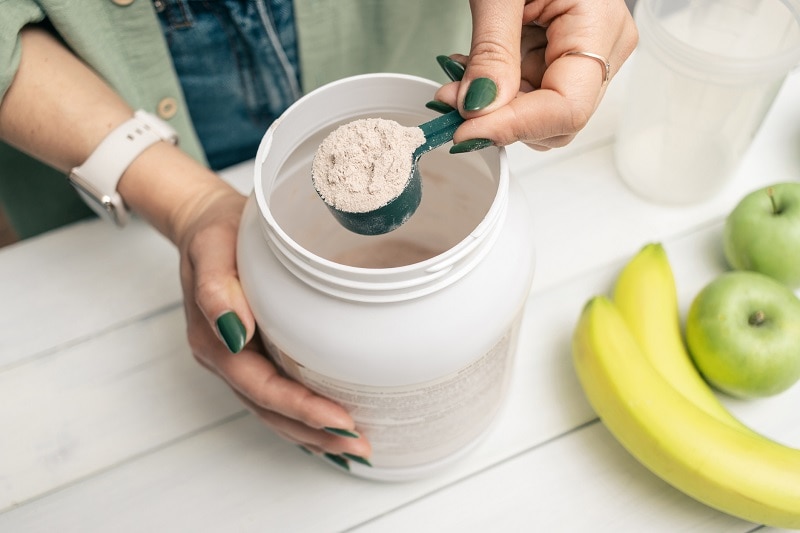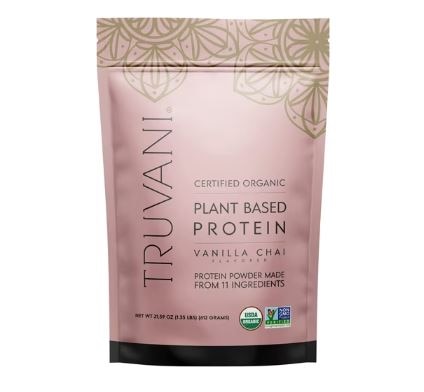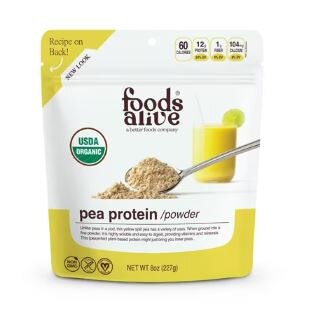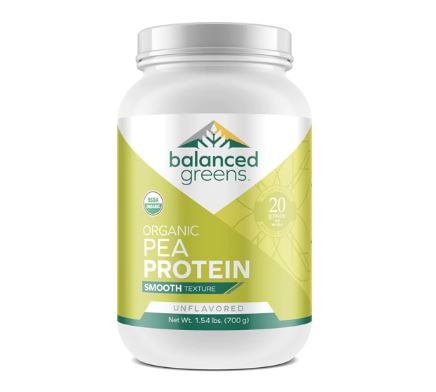If peas were the childhood food you needed to eat to leave the table, you’re in good company. Peas left a bad taste in many a kid’s mouth. But it’s time to give peas (another) chance, this time in the form of a popular plant-based protein – pea protein.
Pea protein is making its way into many products as the trend of increasing protein intake is on the rise. Learn more about pea protein, including the different types, health benefits and how pea protein can be added to your diet.
What is Pea Protein?
Pea protein is pulled from green and yellow split peas (also known as field peas). The peas are dried out and crushed into a fine powder consisting mostly of protein and starch. Starch and other compounds are removed from the powder through an extraction process and the result is pea protein powder. Different purity levels, through further processing, create pea protein concentrate, isolate or a blends.
What are the types of pea protein?
The selection of pea protein on the shelves are numerous. The one that works best is going to be the one that fits your individual needs. To remove the guesswork, knowing the different types can simplify this step.
- Pea protein concentrate is less processed and contains lesser amounts of protein than isolate. (See below to learn more about isolate.) Pea protein concentrate may contain carbohydrates, fiber, fats and/or added sugar.
- Pea protein isolate has a greater percentage of protein, includes amino acids, and lower amounts of carbohydrate and other nutrients.
- A pea protein blend will likely include other types of protein with rice being a prevalent pairing.
- Textured pea protein undergoes little processing. It is not found in the form of a dietary supplement such as powder and is commonly found in meat alternative products.
What are the benefits of pea protein?
Protein supplies the body’s building blocks. It is located in almost every part of the body. As plant-based protein sources are gaining popularity, pea protein stands out because it is entirely vegan, gluten-free, lactose-free, and free of many food allergens, it is easily digested, and it can add variety to our protein intake. If that is not enough, check out these other benefits pea protein can offer to your health and nutritional wellbeing.
- Contains all essential amino acids – Pea protein is composed of all nine of the essential amino acids, however, it is not considered a complete protein due to the lower methionine Eating balanced meals daily including eggs, poultry, fish, beef, legumes, brown rice, soy and nuts will increase methionine in your diet. Pea protein also contains the three branch-chain amino acid (BCAAs) (leucine, isoleucine, and valine) that contribute to muscle progression.
- Better digested – Pea protein is a plant-based protein that is easier on the stomach which aids in better digestion.
- Source of iron – Pea protein powders typically include about 5-7.5mg of iron per serving, providing a good amount towards meeting the recommended daily requirements for many populations. To increase iron absorption, consume with foods high in vitamin C like citrus and berries.
- Improve body composition – Pea protein may support muscle mass increase and maintenance when used along with resistance training.
- Helps with fullness – Protein helps people feel fuller for longer than other macronutrients. Pea protein powder has less calories and is a way to reduce calories, raise protein intake and promote feelings of satiety before and after meals. This may decrease calorie consumption and aid in weight loss and/or maintenance.
- Kidney and cardiovascular health: Lower cholesterol and blood pressure has been associated with pea protein while having minimal effect on the kidneys, possibly preventing kidney problems. Peas and other plant-based powders typically have reduced amounts of fat and cholesterol and higher fiber content compared to some animal protein sources, which may be beneficial for heart health.
- Gut health – Pea protein may also play a role in enhancing the gut microbiome necessary to support gastrointestinal conditions. The fiber in pea protein comprises prebiotics that creates an environment in the gut where healthy bacteria can flourish.
- Anti-inflammatory attributes – The bioactive peptides in pea protein contain antioxidative properties that reduced pro-inflammatory markers in one study.
- Decrease age-related muscle loss – Protein supplements that contain all essential amino acids, such as pea protein, can play a role in reducing sarcopenia (excessive muscle mass decline associated with aging) when engaged in a resistance training routine.
- Environmentally positive – The use of less water, land and soil regeneration are associated with pea plants. Pea protein and other plant-based options create on average lesser amounts of greenhouse gases than animal-derived proteins.
Considerations about pea protein powder?
In the transition from whole peas to peas in the powdered form, nutrients can be adjusted. The nutrition facts label is your guide. Be sure to check for added sodium in pea protein powder. This can be offset by adding this to beverages like a smoothie or foods such as homemade oatmeal with low sodium content.
Pea protein powder of the isolate form may have less fiber, vitamins, minerals and antioxidants that are readily available in the whole pea. By including a pea protein supplement as a part of a healthy meal plan filled with a variety of foods, the reduction of nutrients is barely noticeable.
Even though pea protein is a powerful protein source, remember that this supplement is an incomplete protein. Take a glance at your meals to ensure there are a variety of protein options consumed throughout the day.
Ways to add pea protein powder into your diet
The taste, texture and seamless transformation into beverages and foods makes pea protein powder a sought-after addition to your daily meals. Start with these suggestions then expand your pea protein powder horizons and add your own creative touch.
- Add pea protein powder into smoothies and shakes or combine with juice or water to add more fuel to your day.
- Increase the protein presence in oatmeal, wheat porridge or brown rice cereal.
- Add to muffins, brownies, pancakes, waffles or other baking mixes.
- Create your own popsicle molds with pea protein as one of the ingredients.
- Make plant-based milk a good source of protein with this addition.
- Make your own energy bar and add a serving of pea protein or use as a swap for other protein powders.
- Blend the plain flavored version into yogurt, pudding, dip or homemade salad dressing to elevate their smooth texture without affecting the flavor.
- Whisk into canned or homemade pasta sauce for a pasta dish with a twist of plant-based protein.
A dietitian’s pea protein powder picks
Give these pea protein powders a go as you explore pea protein options. Come on over to Vitacost.com to find the one that works best for you.
- Foods Alive Organic Pea Protein Powder Superfoods
- Balanced Greens Pea Protein Unflavored
- Olympian Labs Lean and Healthy Pea Protein Chocolate
- Naturade Pea Protein™ Vegan Shake Vanilla
- Source Naturals Pea Protein Power
- Isopure Plant-Based Pea & Brown Rice Protein Powder Unflavored
Ready to give pea protein a try? It is a wonderful plant-based option. You will not be disappointed giving pea protein powder a shot as part of your daily meal, snack or workout routine. If you have questions about how and where to include pea protein to meet your protein goals, meet with a registered dietitian, our nutrition experts, to explore all the possibilities.




